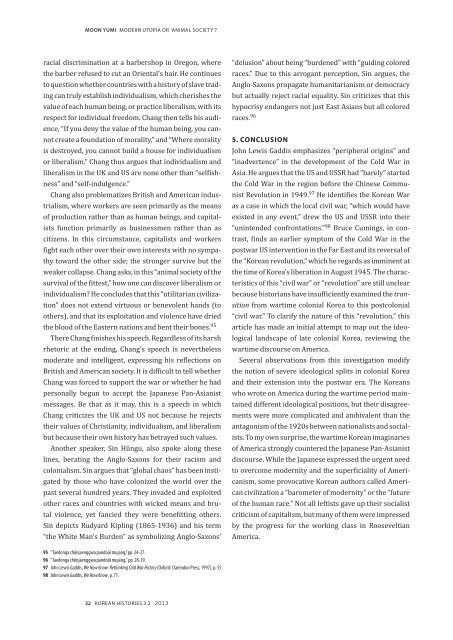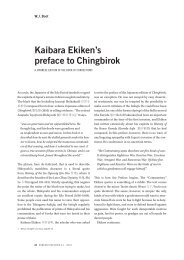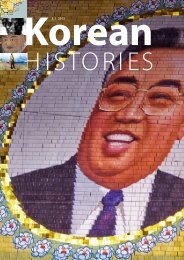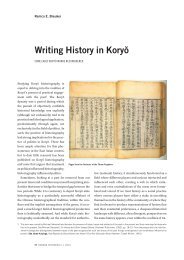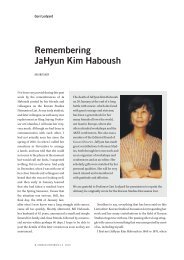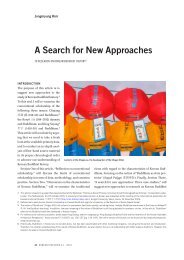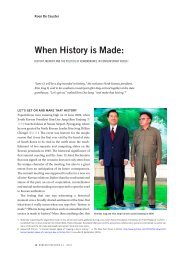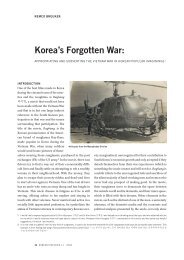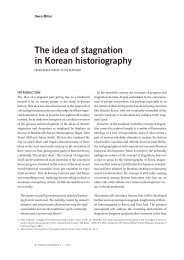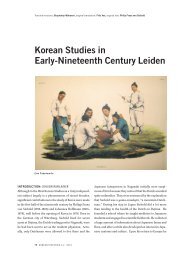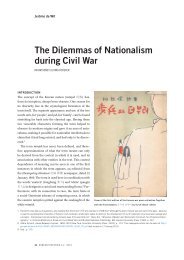Create successful ePaper yourself
Turn your PDF publications into a flip-book with our unique Google optimized e-Paper software.
Moon Yumi Modern Utopia or ‘Animal Society’?<br />
racial discrimination at a barbershop in Oregon, w<strong>here</strong><br />
the barber refused to cut an Oriental’s hair. He continues<br />
to question whether countries with a history of slave trading<br />
can truly establish individualism, which cherishes the<br />
value of each human being, or practice liberalism, with its<br />
respect for individual freedom. Chang then tells his audience,<br />
“If you deny the value of the human being, you cannot<br />
create a foundation of morality,” and “W<strong>here</strong> morality<br />
is destroyed, you cannot build a house for individualism<br />
or liberalism.” Chang thus argues that individualism and<br />
liberalism in the UK and US are none other than “selfishness”<br />
and “self-indulgence.”<br />
Chang also problematizes British and American industrialism,<br />
w<strong>here</strong> workers are seen primarily as the means<br />
of production rather than as human beings, and capitalists<br />
function primarily as businessmen rather than as<br />
citizens. In this circumstance, capitalists and workers<br />
fight each other over their own interests with no sympathy<br />
toward the other side; the stronger survive but the<br />
weaker collapse. Chang asks, in this “animal society of the<br />
survival of the fittest,” how one can discover liberalism or<br />
individualism? He concludes that this “utilitarian civilization”<br />
does not extend virtuous or benevolent hands (to<br />
others), and that its exploitation and violence have dried<br />
the blood of the Eastern nations and bent their bones. 95<br />
T<strong>here</strong> Chang finishes his speech. Regardless of its harsh<br />
rhetoric at the ending, Chang’s speech is nevertheless<br />
moderate and intelligent, expressing his reflections on<br />
British and American society. It is difficult to tell whether<br />
Chang was forced to support the war or whether he had<br />
personally begun to accept the Japanese Pan-Asianist<br />
messages. Be that as it may, this is a speech in which<br />
Chang criticizes the UK and US not because he rejects<br />
their values of Christianity, individualism, and liberalism<br />
but because their own history has betrayed such values.<br />
Another speaker, Sin Hŭngu, also spoke along these<br />
lines, berating the Anglo-Saxons for their racism and<br />
colonialism. Sin argues that “global chaos” has been instigated<br />
by those who have colonized the world over the<br />
past several hundred years. They invaded and exploited<br />
other races and countries with wicked means and brutal<br />
violence, yet fancied they were benefitting others.<br />
Sin depicts Rudyard Kipling (1865-1936) and his term<br />
“the White Man’s Burden” as symbolizing Anglo-Saxons’<br />
“delusion” about being “burdened” with “guiding colored<br />
races.” Due to this arrogant perception, Sin argues, the<br />
Anglo-Saxons propagate humanitarianism or democracy<br />
but actually reject racial equality. Sin criticizes that this<br />
hypocrisy endangers not just East Asians but all colored<br />
races. 96<br />
5. Conclusion<br />
John Lewis Gaddis emphasizes “peripheral origins” and<br />
“inadvertence” in the development of the Cold War in<br />
Asia. He argues that the US and USSR had “barely” started<br />
the Cold War in the region before the Chinese Communist<br />
Revolution in 1949. 97 He identifies the <strong>Korean</strong> War<br />
as a case in which the local civil war, “which would have<br />
existed in any event,” drew the US and USSR into their<br />
“unintended confrontations.” 98 Bruce Cumings, in contrast,<br />
finds an earlier symptom of the Cold War in the<br />
postwar US intervention in the Far East and its reversal of<br />
the “<strong>Korean</strong> revolution,” which he regards as imminent at<br />
the time of Korea’s liberation in August 1945. The characteristics<br />
of this “civil war” or “revolution” are still unclear<br />
because historians have insufficiently examined the transition<br />
from wartime colonial Korea to this postcolonial<br />
“civil war.” To clarify the nature of this “revolution,” this<br />
article has made an initial attempt to map out the ideological<br />
landscape of late colonial Korea, reviewing the<br />
wartime discourse on America.<br />
Several observations from this investigation modify<br />
the notion of severe ideological splits in colonial Korea<br />
and their extension into the postwar era. The <strong>Korean</strong>s<br />
who wrote on America during the wartime period maintained<br />
different ideological positions, but their disagreements<br />
were more complicated and ambivalent than the<br />
antagonism of the 1920s between nationalists and socialists.<br />
To my own surprise, the wartime <strong>Korean</strong> imaginaries<br />
of America strongly countered the Japanese Pan-Asianist<br />
discourse. While the Japanese expressed the urgent need<br />
to overcome modernity and the superficiality of Americanism,<br />
some provocative <strong>Korean</strong> authors called American<br />
civilization a “barometer of modernity” or the “future<br />
of the human race.” Not all leftists gave up their socialist<br />
criticism of capitalism, but many of them were impressed<br />
by the progress for the working class in Rooseveltian<br />
America.<br />
95 “Taedonga chŏnjaenggwa pandoŭi mujang,” pp. 24-27.<br />
96 “Taedonga chŏnjaenggwa pandoŭi mujang,” pp. 28-29.<br />
97 John Lewis Gaddis, We Now Know: Rethinking Cold War History (Oxford: Clarendon Press, 1997), p. 55.<br />
98 John Lewis Gaddis, We Now Know, p. 71.<br />
32 <strong>Korean</strong> <strong>Histories</strong> 3.2 2013


